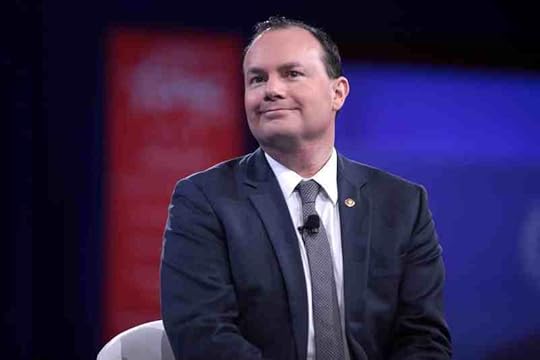Guest Post: Why Mike Lee’s Lack of Apology is Inherently and Unfortunately So Mormon
Guest Post by Emily Peterson

I was never a fan of Mike Lee, but like many Mormons and non-Mormons alike, I have been appalled by his flippant reaction to the assassination of Representative Melissa Hortman of Minnesota. While my instincts are to claim that Mike Lee’s inability to apologize is not representative of Mormonism, I do see ways that this sort of behavior has been enabled and modeled by the Church’s culture and its leaders.
While Lee is being called to apologize, he has failed to acknowledge the harm his Tweets have caused. He issued a more serious statement condemning the violence later on, eventually taking down his initial posts, but has still failed to express a legitimate apology for the harm his actions caused. I see this and think of the Church’s own behavior towards some of its own past bad behavior.
The Church notoriously never apologizes for any of its past behavior, teachings, or statements. It’s behavior towards the history of the priesthood and temple ban alone is utterly lacking. Like JD Vance’s defense in debates over attacks on the Capitol on January 6th, President Oaks seems to only be “focused on the future.” During the celebration of the 40th anniversary of the priesthood and temple ban, for example, Dallin H. Oaks asserted that while some “have wanted to look back” at the painful impacts of the policy, “most in the Church, including its senior leadership, have concentrated on the opportunities of the future rather than the disappointments of the past.” When another white man published a fake apology for the policy in 2018, he re-traumatized many Black members who felt whiplash from the initial feelings of finally getting an apology to the crushing disappointment when it was realized that it was a joke. (This white man, an Ex-Mormon, however, did eventually apologize).
The closest thing to a formal apology from the Church has been the expression of “regret” shared by President Henry B. Eyring on behalf of the Church at the 150th Anniversary of the Mountain Meadows Massacre. While earnest and helpful, however, this sort of language does not adequately do enough to prompt the needed acknowledgement for things to move on. The scriptures do not call for those who do harm to others to “regret,” they demand full repentance.
While some might argue that it is not part of religious institutions to apologize, other traditions offer a glimpse of what is possible. Though apologies alone can be performative and lacking, they are an initial step in the right direction. Pope Francis issued an apology to Indigenous people in Canada for the Catholic church’s role in boarding schools. Even the Southern Baptist Church apologized for its early support of enslavement and segregation. While these apologies obviously do not mean that more action is needed from these parties, they demonstrate how such apologies can be done.
The unfortunate current nature of leadership within the Church fails to hold the always male and often white leaders accountable for poor behavior. Even its lay male members are often excused and enabled to claim no fault when their actions cause meaningful harm. Instead, the burden is placed on those harmed to simply choose not to be offended.
This experience reminded me of an experience I had in my childhood ward in New Jersey. A small ward, I generally have good memories of the ward family that raised me. However, on one particular Sunday, a male transplant from Utah spoke at the pulpit and regurgitated horrendous teachings from Ezra Taft Benson’s apostleship, accusing the Progressives of being Communist infiltrators and asserting that women leaving the home was a central part of Satan’s plan. I was shocked. Growing up in the church, I’d seen instances where Bishops would give nudges or say a few words at the end of the meeting to comment or clarify doctrine, and surely this was an ideal opportunity to do so.This man’s words, however, seemed to cause no unease to the Bishop, who sat idly by and closed the meeting without any further comment about the incredibly harmful remarks. When my Dad approached him after the meeting and asked why he didn’t say anything, the Bishop simply shrugged and shared that it was simply just like the MTC of the mission field, people just say things sometimes and there was no reason to apologize for it.
As a Church, we time and time again fail to keep men accountable for their actions, especially those in positions of power. This can enable poor behavior outside of Church settings, as demonstrated by Lee. If we fail both as a culture and as an institution to promote a culture of openly apologizing, we will only see more of this behavior from LDS men.
Emily is a public historian and graduate student at the University of Maryland-Baltimore County studying history, including the history of Mormon feminism. She currently lives in Baltimore, Maryland, with her husband.



